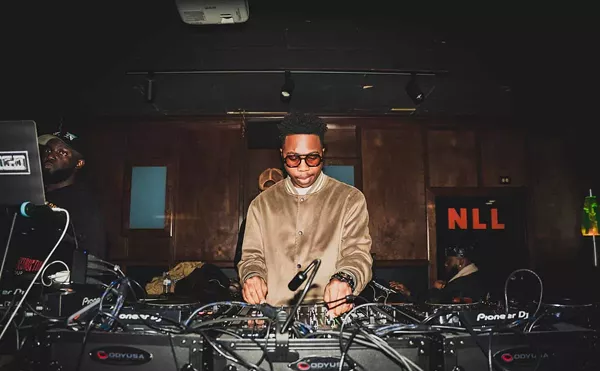
Audio By Carbonatix
[
{
"name": "GPT - Leaderboard - Inline - Content",
"component": "35519556",
"insertPoint": "5th",
"startingPoint": "3",
"requiredCountToDisplay": "3",
"maxInsertions": 100,
"adList": [
{
"adPreset": "LeaderboardInline"
}
]
}
]
Anyone remember Amos ’n’ Andy? Well you’ve probably heard of it if you haven’t seen or heard it. The popular Depression-era radio show became a 1950s CBS television program, despite vehement protests from the National Association for the Advancement of Colored People (NAACP), and helped inspire the 2000 Spike Lee film Bamboozled. “Amos ’n’ Andy” milked what many regarded as humor from the adventures and foibles of its two main characters, while the show’s critics maintained that it promoted the most hurtful and reprehensible stereotypes of black life, presenting black folk as trivial, carefree and irresponsible. Despite the self-sacrificing efforts of W.E.B. DuBois, Ida B. Wells, Marcus Garvey and hundreds of thousands of others, more and less famous, who battled for black equality and respect, Amos perpetuated an image of the black man as weak-minded and submissive, while Andy was lazy and pretentious.
Amos ’n’ Andy — and the old-time, derogatory minstrelsy tradition that it was built on — has somehow, devastatingly, survived into the new millennium. Undoubtedly, numerous wealthy members of the rap music game have perpetuated the legacy, but films like the new comedy, My Baby’s Daddy, are depressingly direct descendants.
It’s no surprise that Eddie Griffin, a fairly talented stand-up comic whose television and film contributions are debatable, is the visionary — if such a word can be used — behind this. Having based much of his screen work on the portrayal of one-dimensional, Amos ’n’ Andy-type characters, Griffin is the producer and co-writer of My Baby’s Daddy. Interestingly, Griffin concentrates on the overdone role of nerdy guy who gets a makeover to get the girl. But clearly, he is more at home in the few scenes where he’s shown lapsing into the more classically stereotypical slang-talking sex-chaser or grinning buffoon.
The film is based on this thin premise: Griffin, as the well-meaning character Lonnie, and his lifelong friends G (Anthony Anderson) and Dom (Michael Imperioli) face unexpected dilemmas when their girlfriends become pregnant. When their three children are born on the same day, what follows is an occasionally humorous story of how the men meet their newfound and serious responsibilities.
About 10 minutes into the film, however, a set of fart jokes gives notice that sophisticated comedy isn’t at hand. As the characters and story deteriorate, stereotypes abound: G’s cousin, No Good, is the young, black male habitual criminal; Lonnie’s love interest is a whorish, gold-digging veteran single mother, who can’t stay home to watch her newborn child because she’s got “strip aerobics”; Cha Ching is the Asian market owner who employs G and watches his every move in the store, along with keeping a distrustful eye on grandpa Bling Bling.
Then there’s the single, assertive professional woman who wants nothing to do with Dom once she gives birth to their daughter, Jasmine, because everyone knows that single, assertive women eventually become vindictive lesbians, right?
Even the movie’s title is inappropriate, considering that the story is never told from the perspective of the women involved. The title is merely an attempt to exploit the language of black culture for mega-dollar gain. It’s no different from rapper Nelly’s marketing and promotion of a party-store-cooler beverage called Pimpjuice.
Moreover, My Baby’s Daddy makes light of the ongoing, unplanned-pregnancy epidemic facing America’s low-income communities, and African-Americans in particular. Too many teenage girls with scant knowledge of motherhood and long-term commitment have their chances at fruitful careers cut short while their children are doomed to live in poverty.
As Uncle Virgil, the talent of John Amos, the powerful veteran actor of 1970s sitcom “Good Times,” is sadly wasted. As the former TV dad of the shameless Jimmy “JJ” Walker, perhaps Amos felt he needed to be reminded again of what it’s like to be in lesser company. As G, Anderson, the lead character in My Baby’s Daddy, who has done more respectable comedic roles, is also a big disappointment, farting and playing to stereotypes like the rest.
In the last line of the film, G observes, with a tone of pleasant surprise that three little babies helped turn him and his buddies into “grown men.” But it’s too little, too late for this thrown-together, 85-minute mess of insulting, juvenile jokes and images to be redeemed as thoughtful or moving. My Baby’s Daddy is ill-conceived, irresponsible and even worse than it looks in commercials. A real head-shaker that will only get laughs from the most indiscriminate of comedy viewers and the unfortunate teenagers who’ve fallen prey to its mentality.
E-mail Eddie B. Allen Jr. at letters@metrotimes.com.






